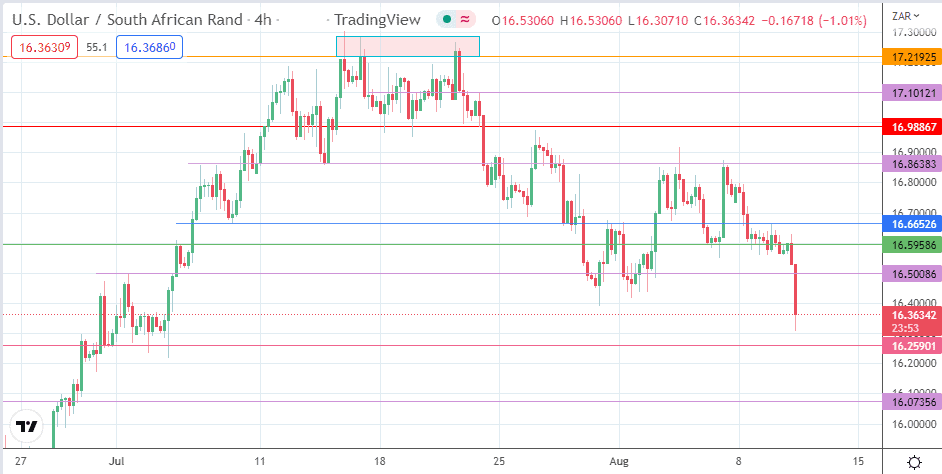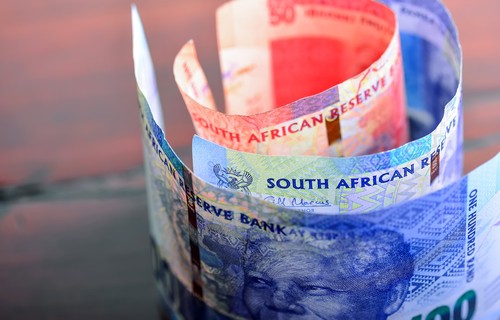- Summary:
- The USD/ZAR forecast going forward following the drop in consumer inflation in the US is presented in this piece.
Table of Contents
Today, the focus of this analysis will be on the USD/ZAR currency pair as it responds to the latest US Consumer Price Index figures. The USD/ZARZAR is the US dollar pairing against the South African Rand. The South African Rand is an emerging market currency. Therefore, it serves as a barometer with which other emerging currencies are gauged in the FX market.
The US Consumer Price Index (headline and core report) measures the state of inflation in the United States. It is used as a tool to determine whether the US Federal Reserve will need to adjust interest rates or not. In addition, this can be used as a UAS/ZAR forecast tool because a rise in US interest rates will channel investment flows out of emerging markets and into US-denominated assets such as the long-term Treasuries. On 10 August 2022, the July report that indicates the current state of consumer inflation in the US is due for release.
The world is currently in an inflationary environment after central banks flooded the financial system with cheap cash and cash-based palliatives to cushion the economic impact of the COVID-19 pandemic. Inflation is now at stratospheric levels with a lot of cash supply chasing after too few goods and services. This follows unmet demand due to skilled staff shortages in various sectors of the global economy and industries still trying to recover full capacity after being shut for months due to lockdowns. The Russia-Ukraine war has also produced a food and energy crisis, leading to galloping prices at the pumps and in the markets. Against this backdrop, the US Federal Reserve has hiked interest rates by 225 points in 2022. Will there be more to come, and what will this do for the USD/ZAR forecast going forward.
USD/ZAR Latest News
The USD/ZAR latest news of note which is expected to have a significant impact on this pair, is how the latest US CPI report will affect the Federal Reserve’s monetary policy trajectory. The greenback has been riding high on the latest Non-Farm Payrolls report of 5 August 2022. The report indicated a robust performance of the US labour market, beating all expectations with a drop in the unemployment rate from 3.6% to 3.5% and adding more than double the number of jobs that economists had predicted.
The NFP has provided the Fed with some leeway to raise rates aggressively without sparking off recessionary risks to the domestic labour market. However, the USD/ZAR latest news regarding the CPI is that there has been a significant drop in consumer inflation. The US CPI for July shows that the headline number has dropped from 1.3% m/m to 0.0% m/m, while the core number discounts food and energy prices also fell from 0.7% to 0.3%. Both data sets beat the consensus figures by falling more than expected, indicating that the Fed’s rate tightening cycle is working. These could give the Fed a reason to slow down on its aggressive rate hike pattern in the short and medium term.
USD/ZAR Forecast 2023
The USD/ZAR forecast 2023 indicates that the greenback will continue to gain against the Rand if the Fed continues to drive its monetary policy tightening into 2023.
After June’s super hot consumer inflation report took US inflation to 40-year highs, the markets began to bet on the Fed increasing interest rates by a full percentage point in its 16 July meeting. However, the Fed did not deliver this, and the 75 bps rate hike undermined the performance of the USD/ZAR. It fell from a peak of 17.2648 on 21 July to a low of 16.38850 on 29 July. The pair peaked at 18.86383 after the 3 August NFP report, but has undergone a correction.
This price picture is not unexpected. Spikes and corrections will play out as the markets change their interest rate expectations. BMO rate strategist Ben Jeffrey had told CNBC earlier in July that the September rate contract was priced at 3.23% for the Fed Funds rate. This would have allowed for an additional 75 bps rate hike minimum by October 2022. But with the latest CPI figures, we could see the Fed drastically slowing down its rate increases or pausing them entirely.
However, a factor to consider in USD/ZAR forecasts 2023 is whether there will be fears of a recession. One of the barometers to be used will be future NFP data. Raising rates too aggressively provokes the risk of recession. Companies do not hire people during a recession. So if NFP data point to a slowing of the US labour market along with signs of consumer inflation dropping further, the Fed may be forced to reduce the scope of its tightening or even stop raising rates entirely.
Taylor Nugent, a markets economist at NAB in Sydney, put it succinctly in a recent statement on Business Standard. He opines that the markets may feel that the Fed has done the major part of its task to control inflation and would be ready to react to slowing activity data. If this is the overall outlook, the USD/ZAR could start to see a plateauing of its recent uptrend in the medium term.
USD/ZAR Forecast 2025
The USD/ZAR forecast 2025 will be determined less by interest rate policy and more by other fundamentals. At this time, it is expected that the impact of COVID-19 would have diminished and inflation would have been controlled. It would now be up to the inherent fundamentals of each economy to exert the demand-supply pull on the constituent currencies.
How well the US and South Africa have recovered from COVID-19 will be one of the dominant factors in determining the USD/ZAR forecasts for 2025. As for the USD/ZAR forecast 2030, the rapid evolution of the dynamics impacting the global economy make it impossible to forecast the value of the USD/ZAR by 2030.
Is USD/ZAR a Good Investment?
The USD/ZAR is a good investment as far as the FX market is concerned. The currency pair has good volatility and is quite sensitive to the prevailing fundamentals.
Trading the USD/ZAR forex pair on ATFX guarantees that there will be opportunities for traders who want to buy or sell the pair. This is because the CFD asset ensures that traders can benefit from rising prices with long orders and falling prices with short positions. It is a question of ensuring that the price moves in whatever direction you have chosen after making your entry and exiting the trade to realize your profits. So you can use USD/ZAR buy or sell orders to trade the pair.
USD/ZAR Technical Analysis
The steep drop in the consumer price index, as shown by the 10 August figures, has prompted a selloff in the USD/ZAR. The 4-hour chart indicates a breakdown of the 16.50086 support, targeting the 16.25901 resistance mark (prior lows of 30 June 2022). A decline below this support gives the bears a pathway to target the 16.07356 support. If the bulls fail to defend this price mark, 15.73828 becomes the next downside target for the bears.
On the flip side, any recovery in the USD/ZAR in the short term has to follow a break of the 16.86383 resistance level. Above this mark, additional targets to the north come in at 16.98867 (19 July low and 26 July high) and at 17.10121 (22 July peak). An additional target to the north will come in at the resistance zone, which has 17.21925 as its floor. This outlook will require a bounce that uncaps the 16.50086 and 16.59586 barriers.
USD/ZAR: 4-Hour Chart



